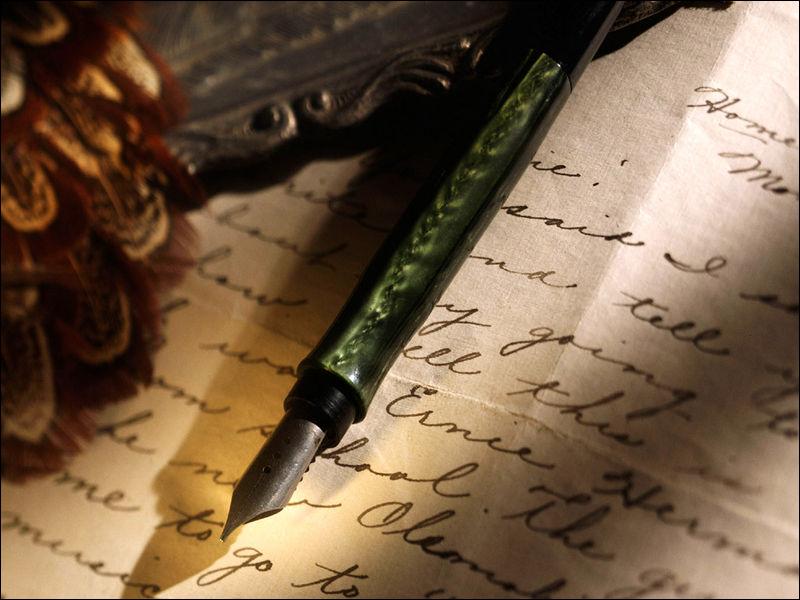Peking University, Nov. 25, 2010: While the popularity of laptops has brought us endless convenience: more information, closer contact, and more convenient means of communication, many people are also sighing with pity, "Less letters, more emails. Too much typing makes us forget how to write."

Gone Are the Days When We Wrote with Pen and Paper.
"When I was a child, every Chinese pupil learned to write from sharpening a pencil. The brush pen was of course indispensible in calligraphy class. I was fond of Chinese painting, therefore, the brush pen was the integrant thing for me." Li Yangfan, teacher of School of International Studies told the reporter. "As a child, I learned to write in all styles of Chinese calligraphy with the brush pen. Having no money to buy rice paper, I used newspapers instead; also no money to buy signets, I made one out of the stone I picked up from the river by myself, using scissors as burin as well. Well, it was inconvenient. But this inconvenience cultivated traditional Chinese culture into my heart. Nowadays doing anything becomes too easy for us that we get little chances to know further about our culture."
Wang Chenyao, teacher of School of Journalism and Communication, also shared her writing experiences with us, "I remember that we had calligraphy classes in primary school. My father valued the calligraphy greatly and he always emphasized on good handwriting. As the Chinese proverb goes, 'the style is the man'."
Maybe not all of us learned calligraphy as a child, writing trough the pencil and paper with full attention and great effort is the precious memory we all share. How happy we were the first time we wrote our own name, and how funny it was because of a mistake we made in writing. Is there any of these pure joys left today, when we are so busy typing on keyboards?
Reality: Fading of Emotions, or Oblivion of Culture?
"Like most people, I have few opportunities to write by hand since computers have popularized. Sometimes I even forget how a Chinese character is correctly written," Li Yangfan told the reporter. Wang Chenyao also said: "Now the only opportunity to handwrite is just to write a few characters on the blackboard during my class." She admitted that even hand-written notes were rare because memos were recorded by cell phone instead. Their story is as well as our story: laptops are always with us, but pens are nowhere to be found; the writing ways of Chinese character are obscure in our brain, and they slip away when we try to write them down; etc..
Words seem to become cheap when we do not spend time writing. E-mails are faster than posts, but at the same time carry less emotion. As Li said, "Our ancestor said that a home letter is a priceless treasure! Today, when writing is digitalized and people can express whatever they want whenever they want to, even download other people' s words and send it as their own. Thus, the emotion within has become pale and void. The kind of excitement when seeing the handwriting of our beloved ones is lost."
An even more worrying probability behind this phenomenon is the losing of traditional Chinese culture inadvertently. "This implicates a crisis here. Chinese is one of a few languages in the world with genuine 'calligraphy' in it. Thus, calligraphy is not just an art form, more important, it is a carrier of culture, which indicates that the loss of Chinese characters' handwriting is actually a great loss of human culture. When brush pen was replaced by pen and pencil, Chinese culture lost some pieces. And now when typing is about to take over handwriting, the loss is becoming more." said Li worriedly, "Even the so-called progress of civilization is likely to be a mere illusion. The digital existence might probably lead to a digital destruction, though it sounds a little sensational."
Future: Our Faith and Hope
On entering one of the dorms of Department of Chinese Language and Literature, several brush pens handing on the wall caught our eyes. They belong to Zhang Yifan, freshman and member of PKU Calligraphy Association. He told us that he started to learn calligraphy since he was a child and it has brought him great pleasure since then. When asked about the relationship between typing and writing, he regarded computer as a technological advancement but insisted that we should never abandon handwriting. "The pleasure I can feel when words flow from the tip of my brush pen onto the paper is my Muse. Without that, my inspiration will shrink." Indeed, the profound emotional connection between Chinese intellects and Chinese characters will keep handwriting an indispensible affair.
Li believed that everyone should shoulder this responsibility. He said: "Even foreigners learn Chinese culture from knowing about the brush pen. We should promote hand writing. For example, teachers may require some homework to be handwritten."
On the other hand, Wang was trying to get the computer and handwritten text into a co-existence. "After all, it is the era of internet. Using computer for word processing is normal. It is not really practical to ask everyone to quit typing and switch back to pen and paper." She believed that hand writing can shoulder the aesthetic function instead, which should be learnt in childhood in order to foster interest and sense of aesthetic. "The ideal scenario is to use computer but still have a good handwriting. Well, of course, not everyone is capable of doing that. But if there is more promotion of handwriting in society, we are at least a little closer to this ideal.”
Translated by: LI Xiaomeng
Edited by: Su Juan
Source: PKU Youth